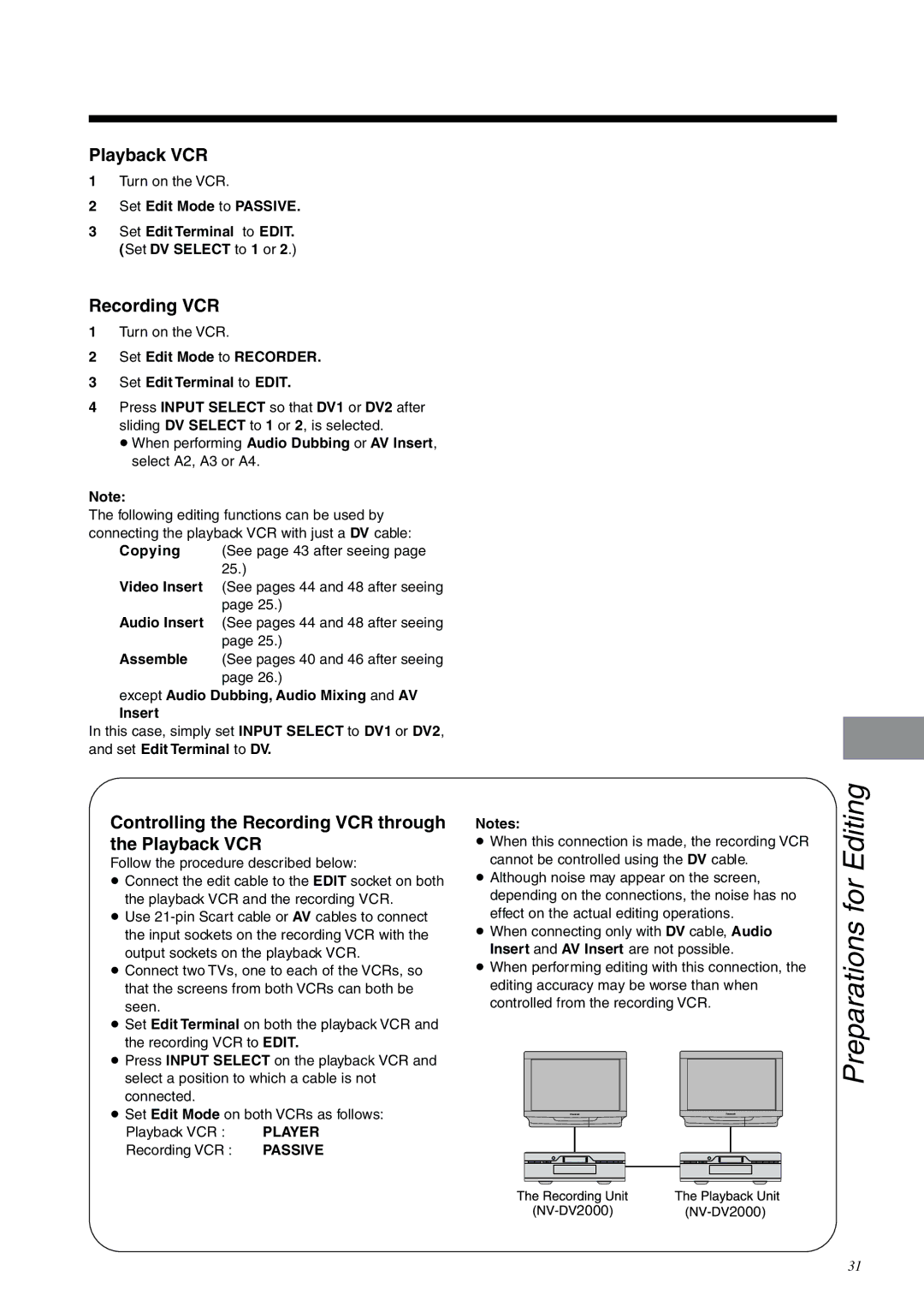Digital Video Cassette Recorder
NV-DV2000EC
Dear Customer
For Your Safety
Contents
Avoid humidity and dust
Avoid sudden changes in temperature
Keep the VCR away from high temperatures
Cleaning the VCR
Before Use
How to Replace the Fuse
For your safety please read the following text carefully
Edit cable 1 pc DV cable 1 pc Batteries for the Editing
Check List
Mixing Edit button R42
Controls and Connection Sockets
Front
Infra-red receiver window Cassette compartment
Rear
Jog Dial/Shuttle Ring R15,39-51Jog Dial inner dial
SET UP button
Editing Controller
Edit Menu button
Counter Zero Stop button R18
Counter Reset button R18
31 VCR1/2/3 switch
Infra-red Transmitter window
Precautions for Battery Replacement
Editing Controller Setup
Installing the Batteries
Power Source for the Editing Controller
Connections Using a 21-Pin Scart Cable
Setting Up
Connections Using an S-Video Cable
Hint
Connection to a Stereo Amplifier/ Connection to a Decoder
Connection to a Stereo Amplifier
Connection to a Decoder
Playback
Playback
1 2 4,5
To Select the Desired Tape Speed
Recording
One-Touch Recording OTR
To Display the Remaining Tape Time
3D DNR Functions
Other Playback and Recording Functions
To Ensure a Stable and Shake-Free Recording Picture TBC
To return to a specified scene zero stop function
Search Functions
Index Search System
Photoshot Index Search System
Video Printer
Using the VCR with a Video Printer
Set Edit Terminal to EDIT, and Edit Mode to
Operations
Using the VCR with a Computer
To set the clock
Clock Setting/Shipping Condition
To Initialise VCR Functions and Edit Functions
Tape running display
Settings for VCR Functions
Audio Data Indicator Audio Output Mode Indicator
Index/Photoshot Index Search Indicator
Comb filter
To Set the Colour mode
Setting for TBC Function
VCR display
For Playback
Settings for 3D DNR REC DNR/PB DNR Function
To Set the Remote mode
For Recording
Preparations for Editing
Editing Functions
Audio Mixing
Audio Dubbing
Assemble Editing
Creating the Tapes for Editing
AV1 Rear Recording Unit Playback Unit
Connecting with a Panasonic Digital Video Camera
Turn on the VCR
Set Edit Mode to Recorder Set Edit Terminal to Edit
Playback Unit Digital Video Camera
Recording Unit NV-DV2000
Front
Recording VCR Playback VCR
Recording VCR
Playback VCR
Recording VCR
Controlling the Recording VCR through the Playback VCR
Playback Unit AV2 Rear AV1 Rear Recording Unit
Connecting an S-VHS VHS Video Equipment with an Edit Socket
Recording VCR NV-DV2000
Playback Unit VHS VHS Video Equipment with an Edit socket
Press Input Select so that A2, A3 or A4 is selected
Connecting a Video Equipment with a Lanc Socket
Set Edit Terminal to 8mm
Playback Unit Video Equipment with a Lanc socket
Audio mode
Settings for Editing
Search with Sound
Press 34 Cursor to select Still Album and press OK
Setting for One-Touch-Edit
Setting for Album Function
Press 21 Cursor to select OFF or ON, and then press OK
Operations Press Still Album to
Album Function
Quick
Editing when Not Using an Edit Cable
One-Touch Assemble
62,4
One-Touch Insert/Audio Dubbing
Editing
For
Press Mixing Edit
Press Audio DUB on the Editing Controller
≥ The picture from the playback unit
Appears on the screen
Operations Press Edit Menu
Manual Copying
To select Start Copying. Player
Press Recorder and JOG/SHUTTLE
Manual Insert
Select Audio Insert
Press Player and JOG/SHUTTLE
To Listen to the Edited Audio after Audio Dubbing
Manual Audio Dubbing
10,11
Programme Assemble
To interrupt editing or Review
Programme
Audio Insert
Programme Insert
5,8
Video Insert
To interrupt editing, Preview or Review
Select Confirm/Change
To continue setting programmes Press Player and JOG/SHUTTLE
Programme Audio Dubbing
To check and change Programmes
To interrupt editing, Preview or Review
Programme Editing
≥ Audio Dubbing is not possible in the following
To Check and Change a Programme
To Cancel a Programme
Other Editing Functions
To Insert a New Programme Between Existing Programmes
Programmes , and then
To Cancel All Editing Programmes
Twice
To select Erase all
Edit start point by setting
Edit Timing Adjustment
To select Timing Adjust
Adjust the timing for
Helpful Hints
Tape Trade Editing
Subtle distortion in the vertical lines which tend to take
Marked with an index signal
Glossary of Terms
This function improves the horizontal shaking
Copying, Assemble, Video Insert, and Audio Insert
DV Terminal
Messages of On Screen Display for Editing Operations
On Screen Display Messages
Recording does not operate correctly
Before Requesting Service
VCR does not operate correctly
Playback does not operate correctly
Editing Controller does not work correctly
SET UP On Screen Displays
Flow Chart for On Screen Displays
Programme Editing
Edit Menu On Screen Display Manual Editing
R64
Programme Editing
Programme Editing On Screen Displays
Confirm/Change
Specifications
Page
F0600Gy0 1500A

![]()
![]()
![]() 2000
2000![]()
![]()
![]()
![]() 2000
2000![]()
